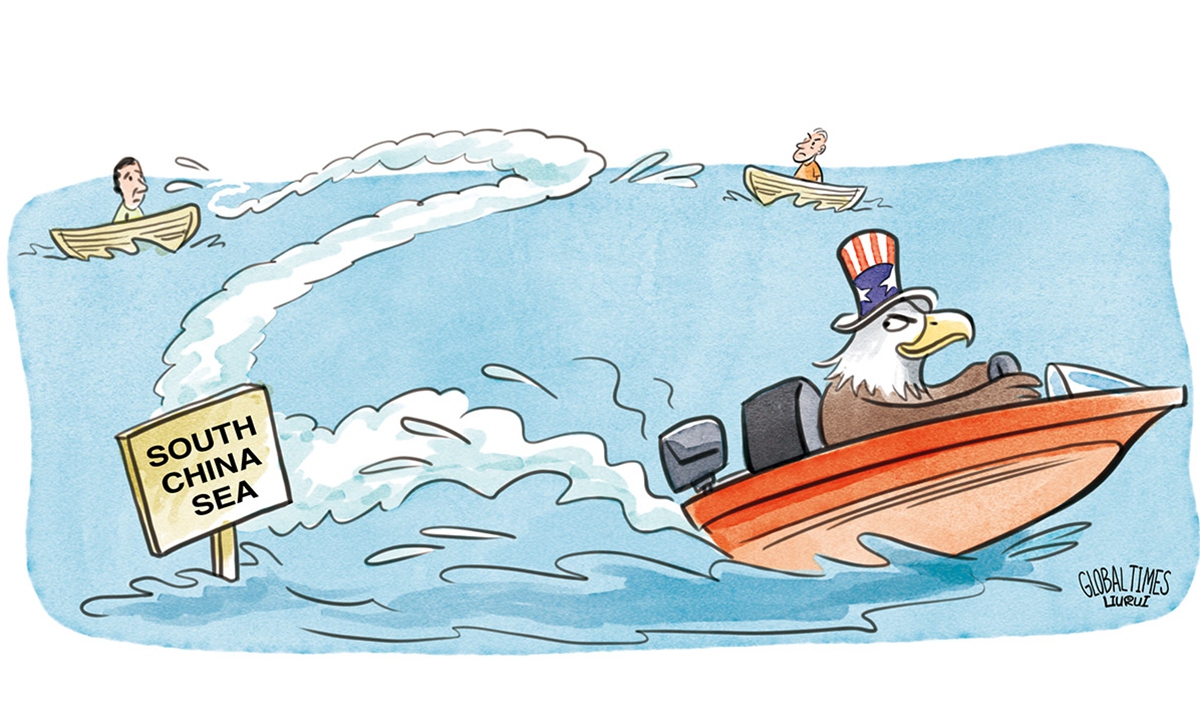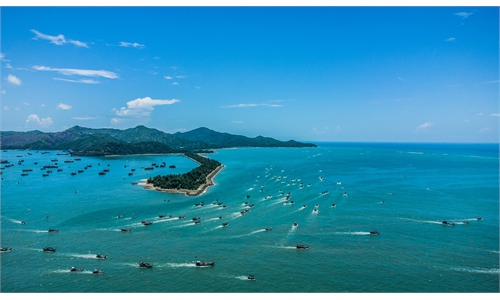
US prefers instability in the South China Sea. Illustration: Liu Rui/GT
There is a certain country that never uses rules to constrain itself, but frequently uses "rules" as an excuse to interfere with other countries' normal acts to defend their own rights. This is not only ridiculous, but also reflects its sense of indolence.The US Department of State on Wednesday issued a report to criticize China's territorial claims in the South China Sea. The report, entitled "Limits in the Seas," declares that China's claims of historical rights in the South China Sea "have no legal basis." It also quoted the 1982 United Nations Convention on the Law of the Sea (UNCLOS), saying that "no provision of the Convention contains the term 'historic rights,' nor is there a uniform understanding of what, specifically, the term means as a matter of international law."
How is the US, a country that has not ratified the UNCLOS itself so far to prevent its maritime hegemony from being restricted, qualified to use the convention to refute China's claims? When the UNCLOS was signed in 1982, it largely reflected the interests of developing countries, forming a constraint on major maritime powers such as the US.
This being the case, the following conclusion is obvious: The US selectively abides by international rules. When Washington believes the rules are not in line with its own interests, it abandons them; when the same set of rules can be used to attack its perceived opponents, it will not hesitate to use the rules as a weapon. The US keeps talking about "rules-based international order," but in fact, it is trying to manipulate that very order.
The US report claimed that China's historical rights "have no legal basis" merely because the exact words are not contained in the UNCLOS and there lacks a common understanding. This does not hold water, and it also deprives China of its right to interpret the convention.
"The signing of the UNCLOS relates to various countries' interests, and is the result of a negotiation and competition. Specific details are often not explained in the convention, and countries that have signed and ratified the UNCLOS have the right to make interpretations, according to the Vienna Convention on the Law of Treaties," Huo Zhengxin, a law professor at the China University of Political Science and Law, told the Global Times.
China is entitled to such legal right. "It is a common example in international law. Countries' interpretations are also a follow-up to the convention and a development of the law," Huo said.
However, the US has been refusing to admit Chinese experts' authoritative interpretations of "historical rights," for such interpretations are not in line with its interests. As always, the US has interpreted the UNCLOS in a selective way, trying to confuse the international community.
In December 2021, US Secretary of State Antony Blinken used the South China Sea issue to deliberately sow discords between China and regional countries during his visit to Indonesia. Most countries are aware of the US' hypocrisy and lack of credibility.
"The term 'historic rights' should be analyzed by experts. But before the experts' professional interpretation is generally understood by people, the US is trying to take a preemptive attack against China. This is another US practice of ignoring the law. With double standards, the US is completely manipulating the international agenda according to its own political needs," Li Haidong, a professor at the Institute of International Relations of the China Foreign Affairs University, told the Global Times.
The US should ratify the UNCLOS first before acting like the police of the world. No matter how it tries to whitewash its hegemonic acts, the US' own rules will never become general rules of the international community.


